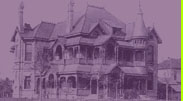OUR LEGACY - The Great Depression
 In 1930, Houston replaced its northern cousin, Dallas, as the most populous city in Texas. Continually increasing numbers of people found Houston both a nice place to visit and an attractive town in which to settle, live and work.
In 1930, Houston replaced its northern cousin, Dallas, as the most populous city in Texas. Continually increasing numbers of people found Houston both a nice place to visit and an attractive town in which to settle, live and work.
Although there were shortages in both housing and work. Houston escaped the most adverse effects of the Great Depression, its economy displaying the resilience which has characterized it ever since. No Banks failed in the dreadful aftermath of the depression. The major developer of the period, lumberman and financier Jesse Jones, persuaded city institutions to pool resources and thus keep weaker banks afloat.
In may 1932, Houston held its first Fat Stock Show, precursor of the immensely popular and internationally famous Houston Livestock Show and Rodeo. In June of that year, Houston Junior College, a community college founded in 1927, became the University of Houston; its first graduating class received its degrees in 1935.






